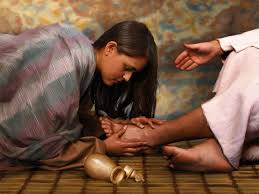HOMILY MONDAY of HOLY WEEK
Mary of Bethany – Model of Genuine Caring
(Isaiah 42:1-7; Ps 27; Jn 12:1-11)
********************************************
Many years ago, well-known spiritual writer Henri Nouwen wrote a book entitled Out of Solitude. It contains three talks he gave to health-care professionals outlining what it means to really care. One of the points he makes is offering a cure or healing without caring for the person, is sometimes more harmful than helpful.
Mary of Bethany in the gospel today teaches us that same lesson – that sometimes, genuine caring is all another person needs to face the vicissitudes of life. She also teaches us the importance of selfless giving.
This gospel takes place with a previous incident of Martha and Mary in the background. In that incident, Martha was upset because Mary was not helping her in the kitchen and was instead seated at Jesus’ feet. Jesus’ response was that Martha was worried about too many things, and that Mary had chosen the better part.
The “better part” Mary had chosen is significant for us. First of all, she was defying all cultural, social and religious mores of that time, because to sit at the feet of a master was a man’s role, the posture of a disciple, and not that of a woman. Also, she was not just listening to the words of Jesus, more, she was aware she was in the presence of the Word made flesh. She believed in who he was, and was content just to be in his presence, soaking up his love.
 That intimate relationship with Jesus led her to actually perform a prophetic and very caring act in the gospel today. Somehow, she knew much more than his disciples, what awaited him – his impending death, and so she anointed him for his burial, as Jesus himself states. She also intuited that although she could do nothing to stop that impending travesty of his trial and crucifixion, she could express her love and caring for him through this anointing. And that, it turns out, is exactly what Jesus needed at that moment. With that expression of love and caring for him in such a gentle, compassionate way, along with the blessings bestowed on him by the Father at his baptism and transfiguration, he now had the strength to go to the cross.
That intimate relationship with Jesus led her to actually perform a prophetic and very caring act in the gospel today. Somehow, she knew much more than his disciples, what awaited him – his impending death, and so she anointed him for his burial, as Jesus himself states. She also intuited that although she could do nothing to stop that impending travesty of his trial and crucifixion, she could express her love and caring for him through this anointing. And that, it turns out, is exactly what Jesus needed at that moment. With that expression of love and caring for him in such a gentle, compassionate way, along with the blessings bestowed on him by the Father at his baptism and transfiguration, he now had the strength to go to the cross.
The pound of nard she brought in was worth a year’s wages at that time. Hers was an extravagant gesture conveying the message that Jesus is more important, and a relationship of listening to him and just being in his presence, as well as following him, more valuable than anything else in the world. Also, the scent of the nard that filled the house with its perfume is a symbol of the Holy Spirit that the risen Jesus would pour out on all who believe in him and seek to follow him, as of Pentecost.
That extravagant gesture of Mary’s also symbolized the total outpouring and self-giving or kenosis of Jesus that would happen on the cross the next day. There was nothing calculated or measured in her gesture – just an emptying out of the contents of that expensive perfume. Contrast her attitude to that of Judas, focused on money, and the chief priests, threatened by the loss of their prestige, power and control. Mary of Bethany lived out the teachings of Henri Nouwen about genuine caring and selfless giving. She is an example for all of us of how we can and should care for each other, no matter how little we can actually do to help at times.

Sr. Helen Préjean at Angola State Penitentiary
Sr. Jean Préjean, whom I met at the Los Angeles Religious education Congress one year, and author of Dead Man Walking which won an Oscar as a movie, is another Mary of Bethany. Knowing there is nothing she can do to stop an execution, she personally cares for each prisoner, doing what she can to support them, encourage them, and lead them to experience the forgiveness of God. With her genuine caring and giving of herself in going to visit inmates on death-row, many of them go to their deaths with hope and a sense of perhaps being loved for the first time in their lives.
The Eucharist is a sacrament making present both the Word of God, and the unconditional love and caring of God shown us by Jesus throughout his ministry and his death on the cross, by which he left us the priceless gift of his body and blood.
May our celebration of the Word today help us to become more like Mary of Bethany and Sr. Jean Préjean, making the love of Jesus present in the lives of others, by our genuine caring for them.



